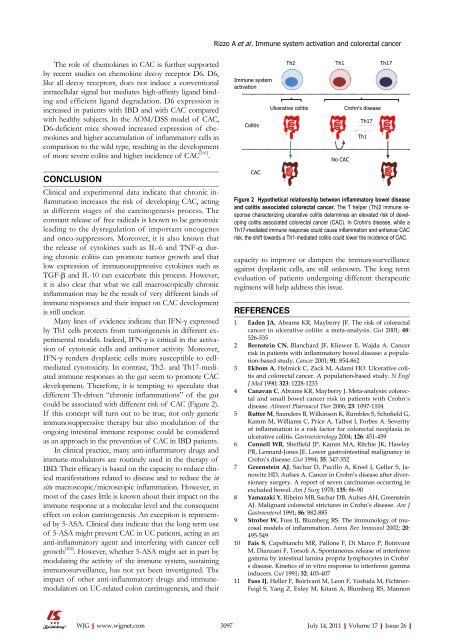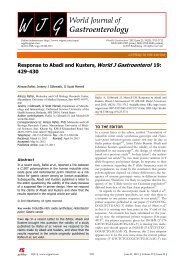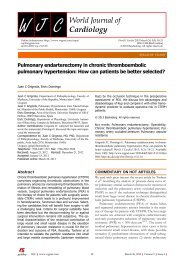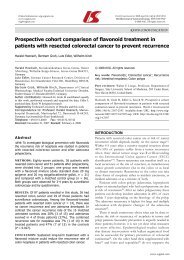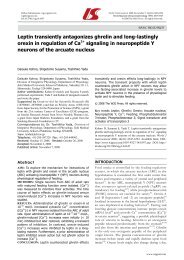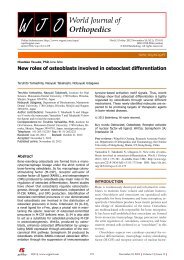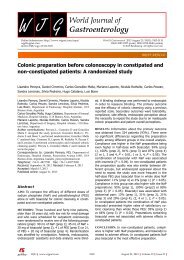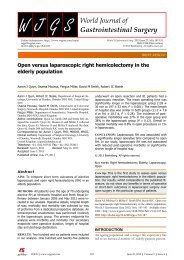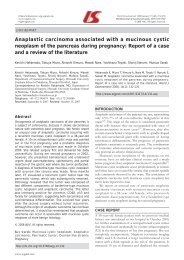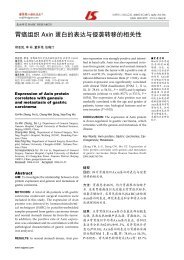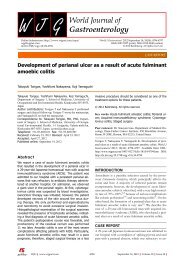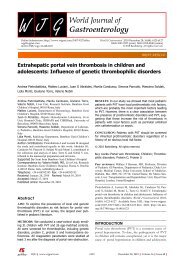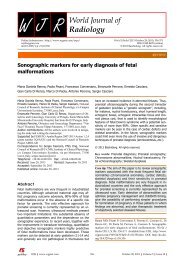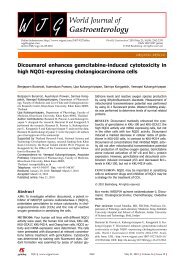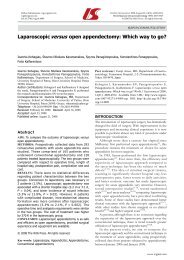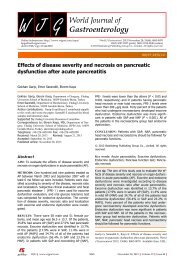26 - World Journal of Gastroenterology
26 - World Journal of Gastroenterology
26 - World Journal of Gastroenterology
Create successful ePaper yourself
Turn your PDF publications into a flip-book with our unique Google optimized e-Paper software.
The role <strong>of</strong> chemokines in CAC is further supported<br />
by recent studies on chemokine decoy receptor D6. D6,<br />
like all decoy receptors, does not induce a conventional<br />
intracellular signal but mediates high-affinity ligand binding<br />
and efficient ligand degradation. D6 expression is<br />
increased in patients with IBD and with CAC compared<br />
with healthy subjects. In the AOM/DSS model <strong>of</strong> CAC,<br />
D6-deficient mice showed increased expression <strong>of</strong> chemokines<br />
and higher accumulation <strong>of</strong> inflammatory cells in<br />
comparison to the wild type, resulting in the development<br />
<strong>of</strong> more severe colitis and higher incidence <strong>of</strong> CAC [101] .<br />
CONCLUSION<br />
Clinical and experimental data indicate that chronic inflammation<br />
increases the risk <strong>of</strong> developing CAC, acting<br />
at different stages <strong>of</strong> the carcinogenesis process. The<br />
constant release <strong>of</strong> free radicals is known to be genotoxic<br />
leading to the dysregulation <strong>of</strong> important oncogenes<br />
and onco-suppressors. Moreover, it is also known that<br />
the release <strong>of</strong> cytokines such as IL-6 and TNF-α during<br />
chronic colitis can promote tumor growth and that<br />
low expression <strong>of</strong> immunosuppressive cytokines such as<br />
TGF-b and IL-10 can exacerbate this process. However,<br />
it is also clear that what we call macroscopically chronic<br />
inflammation may be the result <strong>of</strong> very different kinds <strong>of</strong><br />
immune responses and their impact on CAC development<br />
is still unclear.<br />
Many lines <strong>of</strong> evidence indicate that IFN-γ expressed<br />
by Th1 cells protects from tumorigenesis in different experimental<br />
models. Indeed, IFN-γ is critical in the activation<br />
<strong>of</strong> cytotoxic cells and antitumor activity. Moreover,<br />
IFN-γ renders dysplastic cells more susceptible to cellmediated<br />
cytotoxicity. In contrast, Th2- and Th17-mediated<br />
immune responses in the gut seem to promote CAC<br />
development. Therefore, it is tempting to speculate that<br />
different Th-driven “chronic inflammations” <strong>of</strong> the gut<br />
could be associated with different risk <strong>of</strong> CAC (Figure 2).<br />
If this concept will turn out to be true, not only generic<br />
immunosuppressive therapy but also modulation <strong>of</strong> the<br />
ongoing intestinal immune response could be considered<br />
as an approach in the prevention <strong>of</strong> CAC in IBD patients.<br />
In clinical practice, many anti-inflammatory drugs and<br />
immune-modulators are routinely used in the therapy <strong>of</strong><br />
IBD. Their efficacy is based on the capacity to reduce clinical<br />
manifestations related to disease and to reduce the in<br />
situ macroscopic/microscopic inflammation. However, in<br />
most <strong>of</strong> the cases little is known about their impact on the<br />
immune response at a molecular level and the consequent<br />
effect on colon carcinogenesis. An exception is represented<br />
by 5-ASA. Clinical data indicate that the long term use<br />
<strong>of</strong> 5-ASA might prevent CAC in UC patients, acting as an<br />
anti-inflammatory agent and interfering with cancer cell<br />
growth [102] . However, whether 5-ASA might act in part by<br />
modulating the activity <strong>of</strong> the immune system, sustaining<br />
immunosurveillance, has not yet been investigated. The<br />
impact <strong>of</strong> other anti-inflammatory drugs and immunemodulators<br />
on UC-related colon carcinogenesis, and their<br />
WJG|www.wjgnet.com<br />
Rizzo A et al . Immune system activation and colorectal cancer<br />
Immune system<br />
activation<br />
Colitis<br />
CAC<br />
capacity to improve or dampen the immunosurveillance<br />
against dysplastic cells, are still unknown. The long term<br />
evaluation <strong>of</strong> patients undergoing different therapeutic<br />
regimens will help address this issue.<br />
REFERENCES<br />
Th2 Th1 Th17<br />
Ulcerative colitis Crohn's disease<br />
No CAC<br />
Th17<br />
1 Eaden JA, Abrams KR, Mayberry JF. The risk <strong>of</strong> colorectal<br />
cancer in ulcerative colitis: a meta-analysis. Gut 2001; 48:<br />
5<strong>26</strong>-535<br />
2 Bernstein CN, Blanchard JF, Kliewer E, Wajda A. Cancer<br />
risk in patients with inflammatory bowel disease: a population-based<br />
study. Cancer 2001; 91: 854-862<br />
3 Ekbom A, Helmick C, Zack M, Adami HO. Ulcerative colitis<br />
and colorectal cancer. A population-based study. N Engl<br />
J Med 1990; 323: 1228-1233<br />
4 Canavan C, Abrams KR, Mayberry J. Meta-analysis: colorectal<br />
and small bowel cancer risk in patients with Crohn’s<br />
disease. Aliment Pharmacol Ther 2006; 23: 1097-1104<br />
5 Rutter M, Saunders B, Wilkinson K, Rumbles S, Sch<strong>of</strong>ield G,<br />
Kamm M, Williams C, Price A, Talbot I, Forbes A. Severity<br />
<strong>of</strong> inflammation is a risk factor for colorectal neoplasia in<br />
ulcerative colitis. <strong>Gastroenterology</strong> 2004; 1<strong>26</strong>: 451-459<br />
6 Connell WR, Sheffield JP, Kamm MA, Ritchie JK, Hawley<br />
PR, Lennard-Jones JE. Lower gastrointestinal malignancy in<br />
Crohn’s disease. Gut 1994; 35: 347-352<br />
7 Greenstein AJ, Sachar D, Pucillo A, Kreel I, Geller S, Janowitz<br />
HD, Aufses A. Cancer in Crohn’s disease after diversionary<br />
surgery. A report <strong>of</strong> seven carcinomas occurring in<br />
excluded bowel. Am J Surg 1978; 135: 86-90<br />
8 Yamazaki Y, Ribeiro MB, Sachar DB, Aufses AH, Greenstein<br />
AJ. Malignant colorectal strictures in Crohn’s disease. Am J<br />
Gastroenterol 1991; 86: 882-885<br />
9 Strober W, Fuss IJ, Blumberg RS. The immunology <strong>of</strong> mucosal<br />
models <strong>of</strong> inflammation. Annu Rev Immunol 2002; 20:<br />
495-549<br />
10 Fais S, Capobianchi MR, Pallone F, Di Marco P, Boirivant<br />
M, Dianzani F, Torsoli A. Spontaneous release <strong>of</strong> interferon<br />
gamma by intestinal lamina propria lymphocytes in Crohn’<br />
s disease. Kinetics <strong>of</strong> in vitro response to interferon gamma<br />
inducers. Gut 1991; 32: 403-407<br />
11 Fuss IJ, Heller F, Boirivant M, Leon F, Yoshida M, Fichtner-<br />
Feigl S, Yang Z, Exley M, Kitani A, Blumberg RS, Mannon<br />
3097 July 14, 2011|Volume 17|Issue <strong>26</strong>|<br />
Th1<br />
Figure 2 Hypothetical relationship between inflammatory bowel disease<br />
and colitis associated colorectal cancer. The T helper (Th)2 immune response<br />
characterizing ulcerative colitis determines an elevated risk <strong>of</strong> developing<br />
colitis associated colorectal cancer (CAC). In Crohn's disease, while a<br />
Th17-mediated immune response could cause inflammation and enhance CAC<br />
risk, the shift towards a Th1-mediated colitis could lower the incidence <strong>of</strong> CAC.


